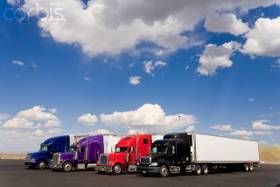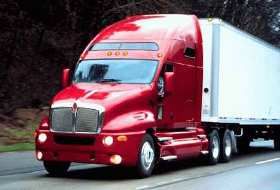Steven's Driving Academy....Am I Going?
Topic 741 | Page 1

I knew a person that went through the program. Don't know if he is still with them.
Dave
I don't know of any reason not to go with them. I know Corporal Clegg leased a truck through them for a while and I would highly recommend staying away from leasing altogether. I know Stevens will try to push the leasing idea at least a little bit, and believe me - they'll make it sound like a pile of gold that only a fool would refuse. But remember - if it was that easy, we'd all be doing it.
And keep in mind also that the first company you work for is simply a way to get your foot in the door, learn to handle that rig, and learn how to handle life on the road. It's not a life sentence. Once you get a year of safe over the road driving under your belt you can work for just about any company in the nation. So if you like Stevens - great! If you decide after a while you'd like to go somewhere else - great!
I can't remember how long you have to stay with them before your tuition is paid in full, but even if you decide to leave before the term is up it's no big deal. They'll give you a bill for the prorated amount you owe and you pay em back - just like you would a private school.
If they seem to be offering what you're looking for, then I say go for it. You'll get your career rollin, you'll establish some safe driving experience, and you'll be free to work elsewhere if you so choose before you know it anyhow. 
Over The Road:
Over The Road
OTR driving normally means you'll be hauling freight to various customers throughout your company's hauling region. It often entails being gone from home for two to three weeks at a time.
OOS:
When a violation by either a driver or company is confirmed, an out-of-service order removes either the driver or the vehicle from the roadway until the violation is corrected.

Brett is spot on....Stevens has nice trucks, and I think they will give you all the miles you want, or can do. But in their school, they beat you to death with their lease program....and you DON'T wanna do it....NO NO NO NO........

I would just recommend for you to look closely at their pay. I have been pre hired with them and what turned me away from them was the pay. According to the pre hire letter that I got and pay chart, they star you off at 31 cpm I believe. But, to reach their maximum pay which is 41 cpm it takes 14 years of working form them.
I am not saying that they are a bad company, just wanted to point out something that I found out after digging around a bit.
CPM:
Cents Per Mile
Drivers are often paid by the mile and it's given in cents per mile, or cpm.
Pre Hire:
What Exactly Is A Pre-Hire Letter?
Pre-hire letters are acceptance letters from trucking companies to students, or even potential students, to verify placement. The trucking companies are saying in writing that the student, or potential student, appears to meet the company's minimum hiring requirements and is welcome to attend their orientation at the company’s expense once he or she graduates from truck driving school and has their CDL in hand.
We have an excellent article that will help you Understand The Pre-Hire Process.
A Pre-Hire Letter Is Not A Guarantee Of Employment
The people that receive a pre-hire letter are people who meet the company's minimum hiring requirements, but it is not an employment contract. It is an invitation to orientation, and the orientation itself is a prerequisite to employment.
During the orientation you will get a physical, drug screen, and background check done. These and other qualifications must be met before someone in orientation is officially hired.

Thank you all for your comments. On thing I like about this forum are the honest comments WITHOUT all the drama!
Below, you will find the email I sent to Steven's today. After saying "yes," I found out what out-of-pocket costs I would incur within the next seven weeks, and $900 seemed a little steep!
So, I will revert back to Plan B, which is taking a CDL course at our local community college.
Now the email:
It is with great reluctance that I must inform you, that is Steven's Transport, that I must cancel attendance at the Colorado Driving School, scheduled to start July 8, 2013.
This decision was a difficult one; and, Lisa, it has NOTHING that you or Clayton did or said. After receiving all the information, specifically what my out of pocket expenses would be to get my license, I determined I could not afford that expense in the next seven weeks.
I do thank you and Clayton for all the time you two spent with me. And if anyone asks me about driver training, I will recommend Steven's and more importantly you.
Again thank you. Please confirm receipt of this email.
Lawrence
Again, thank you all for your support.
Lawrence
CDL:
Commercial Driver's License (CDL)
A CDL is required to drive any of the following vehicles:
- Any combination of vehicles with a gross combined weight rating (GCWR) of 26,001 or more pounds, providing the gross vehicle weight rating (GVWR) of the vehicle being towed is in excess of 10,000 pounds.
- Any single vehicle with a GVWR of 26,001 or more pounds, or any such vehicle towing another not in excess of 10,000 pounds.
- Any vehicle, regardless of size, designed to transport 16 or more persons, including the driver.
- Any vehicle required by federal regulations to be placarded while transporting hazardous materials.

Lawrence, probably a good call for plan B . my choice was private school with MN state recognition. Though if you know you have chosen OTR the Co sponsered training is not a bad option. Commercial Drivers License opens you up to a wealth of otherwise unobtainable opportunity. Even if only B class straight truck, chaffuer, etc... That is why i did not want to be beholden to a particular company.
That being said, you have come to the right place for honest answers regarding the industry. Do a full check of any possible disqualifiers first! Criminal history, DWI's Medical ( epilepsy, pain perscriptions ) etc...
Then the best advice I can offer is to take FULL advantage of the "High Road Series" - CDL training offered here.
Do- general knowledge, combination, and airbrake. Then get your permit. go to school. go online and fill out a bunch of apps. YOU WILL get a number of prehires. Sort out the best hometime that works for you ( cause at the end of the day/week the pay for new drivers is about the same) Like every one here says " Work for that comany for at least 1 year " you will be set. Good Luck.
CDL:
Commercial Driver's License (CDL)
A CDL is required to drive any of the following vehicles:
- Any combination of vehicles with a gross combined weight rating (GCWR) of 26,001 or more pounds, providing the gross vehicle weight rating (GVWR) of the vehicle being towed is in excess of 10,000 pounds.
- Any single vehicle with a GVWR of 26,001 or more pounds, or any such vehicle towing another not in excess of 10,000 pounds.
- Any vehicle, regardless of size, designed to transport 16 or more persons, including the driver.
- Any vehicle required by federal regulations to be placarded while transporting hazardous materials.
OTR:
Over The Road
OTR driving normally means you'll be hauling freight to various customers throughout your company's hauling region. It often entails being gone from home for two to three weeks at a time.
Prehire:
What Exactly Is A Pre-Hire Letter?
Pre-hire letters are acceptance letters from trucking companies to students, or even potential students, to verify placement. The trucking companies are saying in writing that the student, or potential student, appears to meet the company's minimum hiring requirements and is welcome to attend their orientation at the company’s expense once he or she graduates from truck driving school and has their CDL in hand.
We have an excellent article that will help you Understand The Pre-Hire Process.
A Pre-Hire Letter Is Not A Guarantee Of Employment
The people that receive a pre-hire letter are people who meet the company's minimum hiring requirements, but it is not an employment contract. It is an invitation to orientation, and the orientation itself is a prerequisite to employment.
During the orientation you will get a physical, drug screen, and background check done. These and other qualifications must be met before someone in orientation is officially hired.
Prehires:
What Exactly Is A Pre-Hire Letter?
Pre-hire letters are acceptance letters from trucking companies to students, or even potential students, to verify placement. The trucking companies are saying in writing that the student, or potential student, appears to meet the company's minimum hiring requirements and is welcome to attend their orientation at the company’s expense once he or she graduates from truck driving school and has their CDL in hand.
We have an excellent article that will help you Understand The Pre-Hire Process.
A Pre-Hire Letter Is Not A Guarantee Of Employment
The people that receive a pre-hire letter are people who meet the company's minimum hiring requirements, but it is not an employment contract. It is an invitation to orientation, and the orientation itself is a prerequisite to employment.
During the orientation you will get a physical, drug screen, and background check done. These and other qualifications must be met before someone in orientation is officially hired.
HOS:
Hours Of Service
HOS refers to the logbook hours of service regulations.DWI:
Driving While Intoxicated
After saying "yes," I found out what out-of-pocket costs I would incur within the next seven weeks, and $900 seemed a little steep!
So, I will revert back to Plan B, which is taking a CDL course at our local community college.
What did they say the out of pocket expenses would be for? Was it for actual training materials & school-related costs, or were they including things like food & laundry. Because you can barely eat for 7 weeks on $900 and we usually recommend that people save about $1000 if they can to cover costs during training.
CDL:
Commercial Driver's License (CDL)
A CDL is required to drive any of the following vehicles:
- Any combination of vehicles with a gross combined weight rating (GCWR) of 26,001 or more pounds, providing the gross vehicle weight rating (GVWR) of the vehicle being towed is in excess of 10,000 pounds.
- Any single vehicle with a GVWR of 26,001 or more pounds, or any such vehicle towing another not in excess of 10,000 pounds.
- Any vehicle, regardless of size, designed to transport 16 or more persons, including the driver.
- Any vehicle required by federal regulations to be placarded while transporting hazardous materials.

I don't know about the Stevens Academy, as I went there with my CDL in hand, but just to clarify, in case anyone else reads through this. Even though I already had a CDL, I still had to go through their training, which wasn't bad at all...
Now I don't know anything about training in Colorado, as Stevens only has ONE terminal , which is in Dallas, Tx. (though I know of a drop yard they have down in Laredo) but we (CDL holders--it's all longer for the Academy students) went through one week of classes, 5 weeks out with a trainer, another week of classes, and then 3 weeks "Trainee to Trainee" (two trainees in one truck) and then you go solo. During your time with your trainer, you WILL be required to go to all 5 "zones" of the country, bump a dock in the northeast (mine was in Trenton and easy-peasy) and do 3 "approved" mountains (at least 5 mile long with a minimum 6% downhill grade--don't worry, they'll sell you your "mountain guides" so you know which ones qualify.)
While you're in training, you get $300.00 a week (gross) and then once you go solo (unless you have recent prior experience) you start at .26/mile.
CDL:
Commercial Driver's License (CDL)
A CDL is required to drive any of the following vehicles:
- Any combination of vehicles with a gross combined weight rating (GCWR) of 26,001 or more pounds, providing the gross vehicle weight rating (GVWR) of the vehicle being towed is in excess of 10,000 pounds.
- Any single vehicle with a GVWR of 26,001 or more pounds, or any such vehicle towing another not in excess of 10,000 pounds.
- Any vehicle, regardless of size, designed to transport 16 or more persons, including the driver.
- Any vehicle required by federal regulations to be placarded while transporting hazardous materials.
Terminal:
A facility where trucking companies operate out of, or their "home base" if you will. A lot of major companies have multiple terminals around the country which usually consist of the main office building, a drop lot for trailers, and sometimes a repair shop and wash facilities.

I'm curious about the out-of-pocket expenses as well. I'm considering Stevens mainly because of their extensive three month training course. Although I'm really confident in my driving skills, I know nothing about an 18 wheeler. I rather be confident in my skills during training then be uncertain after my training is over.
New Reply:
New! Check out our help videos for a better understanding of our forum features

















Preview:
This topic has the following tags:
Becoming A Truck Driver Choosing A Truck Driving School Company Sponsored CDL Training Stevens Transport Truck Driver Training







 TT On Facebook
TT On Facebook
Well, it looks like it is "crunch" time. I have been "accepted" at Steven's, and now I have to make the decision of whether I really want to go or not.
If I do, I will be going to the Denver school--a 24-hour bus ride.
I was pleased with the interchange between myself and the recruiter. Almost all of the information on this site about Steven's company sponsored training was correct, which also made me pleased.
This is a big decision for me, and for my son and daughter-in-law. I have been helping them with errands, etc., and of course, that will disappear.
If anyone has any pros, cons, concerns, cautions, advice about Steven's, I would appreciate it. I think that Corporal ?? went through it, and has been happily driving for them for several years.
Steven's does have a terminal about 100 miles from me, so maybe when I go solo, I will either be able to drive the tractor (or tractor/load) home, or I can park my car at the terminal.
Lawrence
Terminal:
A facility where trucking companies operate out of, or their "home base" if you will. A lot of major companies have multiple terminals around the country which usually consist of the main office building, a drop lot for trailers, and sometimes a repair shop and wash facilities.
SAP:
Substance Abuse Professional
The Substance Abuse Professional (SAP) is a person who evaluates employees who have violated a DOT drug and alcohol program regulation and makes recommendations concerning education, treatment, follow-up testing, and aftercare.
Company Sponsored Training:
A Company-Sponsored Training Program is a school that is owned and operated by a trucking company.
The schooling often requires little or no money up front. Instead of paying up-front tuition you will sign an agreement to work for the company for a specified amount of time after graduation, usually around a year, at a slightly lower rate of pay in order to pay for the training.
If you choose to quit working for the company before your year is up, they will normally require you to pay back a prorated amount of money for the schooling. The amount you pay back will be comparable to what you would have paid if you went to an independently owned school.
Company-sponsored training can be an excellent way to get your career underway if you can't afford the tuition up front for private schooling.